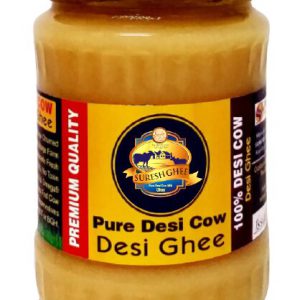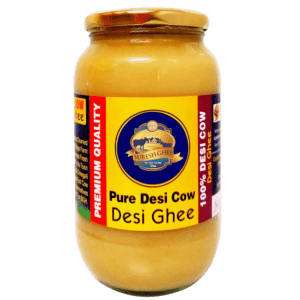What Is Ghee?
Ghee is nothing but clarified butter, desi cow ghee is made by separating the milk solids and the butterfat in processed butter while heating the water to evaporate. In the classic French style, the pure butterfat gets strained quickly and utilize in its pale golden state; the Indian bread cow ghee completes the process a step further, essentially caramelizing the milk butterfat before straining the butterfat to offer the desi ghee a nutty flavour and a deeper colour.
Read more : Benefits of desi cow ghee
How to use ghee
Ghee is a better alternative than butter in high-heat cooking since it has a smoke point of 450 F, compared to 350 F for ordinary butter. The fat most commonly helpful in Indian cooking, ghee can be utilized for making butter or oil in most delicious foods. Ghee can be a better choice than vegetable oil or coconut oil in baking or helpful for sautéing and deep-frying. Or simply smear it or spread it on bread as a snack, allowing it to melt over popcorn.
What does it taste like?
Ghee is the same in taste like butter but with a little roasted, nutty flavor. Due to removing the milk solids, ghee doesn’t have more creamer properties like butter. Ghee survives softly at room temperature but appears firm and granular in the refrigerator. Like butter, ghee is available in various flavors but if you want to go for a quality product then always choose ghee made from desi cow ghee. If you want to buy ghee then visit our website: https://sureshfoods.com/
Read more: Good fats and bad fats for diabetes
Ghee can obtain from different cow breed:
Sahiwal cow ghee
Sahiwal cows offer more quantity of milk as compared to other desi cow breeds. Cow milk is useful for diabetic patients because it delivers a rich source of calcium, a mineral important for good health. Milk is fortified mainly by vitamin D, which is also beneficial for sugar levels.
Grass-fed cow ghee:
The 100% grass-fed cow’s milk itself is more beneficial than other milk sources in many ways. Grass-fed cow ghee includes higher levels of vitamin K2, a nutrient that is extremely useful for sugar levels.
The Omega-3 fatty acid resolves the critical issues regarding blood sugar levels. The presence of Conjugated Linoleic Acid (CLA) provides good trans-fat (as opposed to the bad trans-fats produced in a factory); it’s been connected to positive health effects, such as superior heart health and tumor tissue.
Grass-fed cow ghee has rich levels of vitamin A and carotene. Apart from all the nutritional advantages, Grass-fed cow ghee is useful for getting rid of many health issues.
Indian breed cow ghee:
Pure Indian breed cow’s ghee is also recognized for immense medicinal benefits and is majorly useful for health. In all Ayurvedic treatments, ghee has a dominant place in healing wounds and rejuvenating the body.
The medicinal characteristics of desi cow’s ghee are useful in enhancing memory, boosting intelligence, developing brain functions, and peace of mind. Pure desi cow’s ghee is also utilized in boosting body energy, by improving the digestive system, Ayurveda has an important place reserved for ghee.
Desi cow ghee acts as a carrier for herbs and bhasmas because of its essential penetrating qualities and thus capacity to carry these ingredients deep into the tissues. It is used to heal the body from the inside out.
How is ghee helpful for diabetics?
Ghee contains a low carbohydrate level, and therefore it works as a wonder for diabetics as they offer a low carbs diet. Ghee is a rich source of healthy fat and it contains vitamin K2 which helps our body to absorb the essential vitamins that our food can consume.
This further is useful in controlling high blood sugar levels, offering better management of diabetes. Macrobiotic nutritionists and health coaches say that ghee is a medicine for diabetics. The presence of fatty acids in ghee helps in metabolizing and regulating high blood sugar.
When a spoonful of ghee is added to rice, it is healthy for the diabetics as it offers them digestion of the sugar from rice generously. Ideally, ghee prepared from the milk of desi cows delivers maximum benefits.
Ghee has immense health advantages to deliver. But you have to eat it within the prescribed limits to benefit from it.
Ghee has plenty of benefits, which can help diabetics in the following ways:
- The moderate amount of ghee in your daily diet. stimulates the smoothness of the digestive system and will solve the issues regarding constipation if any.
- As mentioned earlier as well, the fats in ghee have to absorb the properties of the nutrients from the food that you eat. This helps in diabetes management as it increases the immunity system of the body.
- Those who are suffering from cardiovascular diseases create complications in diabetes patients. Ghee enriched with linoleic acid helps to reduce the chances of these diseases.
- The right amount of ghee melts down the fat deposits that are accumulated in the body. This too helps in managing diabetes better.
- GLP-1 is essential for gut hormones. Ghee helps to improve the functioning of GLP 1. So that there is a better secretion of the hormone insulin.
- In diabetes, as we know, the immune system of the body gets weakened. As a result, the beta cells of the pancreas get destroyed. Due to this damage, the glucose that we have taken out from different food items is not converted into large levels of energy. And that is why we have increased levels of blood glucose. Another benefit of the gut hormone GLP-1 working efficiently is that the damage to the pancreatic beta cells is reduced.
- GLP-1 offers to delay the absorption of carbohydrates, protects gastric secretion and as a result, the person feels not hungry for a longer period. So the sugar index falls and there is a low chance of exceeding blood sugar levels.
- Carbohydrates-rich recipes such as parathas, rice, dosa, idly, etc possess a high glycemic index. When you can use ghee, the same food becomes low in the glycemic index as ghee absorbs sugar from the food and helps those with diabetes.
- Ghee is a rich source of vitamins such as vitamin A, vitamin E, vitamin D, vitamin K, as well as beta-carotene. These antioxidants are hugely beneficial for managing diabetes.
- The benefit of using organic desi cow ghee is free of any type of preservatives or fatty acids, which could otherwise affect diabetics.
- The appropriate quantity of ghee in your everyday meal can lower your bad cholesterol.
- A diabetic needs to be more careful about the moderation of ghee consumption. You should not consume more than 500 grams of ghee in a month. This means limits to a couple of spoons of ghee in a day.
- You can prepare your homemade pure ghee. This would make you sure that you are not consuming the harms of added artificial flavors to ghee bought from the market.
- When you buy ghee from the market, ensure about the source and if you can eat the ghee obtained from the milk of grass-fed cows, it would offer you optimal benefits.
- If you have put on weight and are struggling to lose weight, you need to consume the amount of ghee that you are eating in moderation.
Read More: Desi cow ghee and insulin resistance
What is the Impact of Ghee on Health ?
Ghee is mostly sought after as a healthier alternative in culinary options. Although, it is necessary to understand that its primary composition is fat, as it is essentially clarified butter.
Irrespective of its fat consistency, ghee is considered for its potential health benefits and is even utilized medicinally. It consists of essential nutrients that are renowned to contribute to the well-being of individuals, specifically those managing diabetes. The nutritional elements of ghee make it a considered choice to support the health of individuals combating diabetes.
What is the Impact of Ghee on Blood Sugar Levels ?
An imperative consideration for individuals with diabetes is the essential effect of food on blood sugar levels. Maintaining a diet with a minimal glycemic index is imperative in such a context, as the glycemic index reflects how promptly and significantly a specific food category can result in spiking the blood sugar levels. A high level of glycemic index (GI) foods can lead to both short-term and long-term complications for individuals with diabetes, leading to a constant elevation of blood sugar levels. Implementing ghee into meals has been evaluated to minimize the entire glycemic index of the food. This effect adds towards the regulation of blood sugar levels, converting foods that might otherwise lead to a spike in sugars into more manageable choices.
What is the Optimal Use of Ghee in Diabetes Management ?
Expert nutritionists suggest a measured approach to implement ghee into the diet for individuals with diabetes. It is suggested not to exceed more than one teaspoon of ghee when contributing it to dishes like dal or rice. Similarly, when implementing ghee to other carbohydrate-rich foods, such as those with high carb levels, it is suggested to limit the quantity to one teaspoon.
While this quantity may seem minimal, it delivers an imperative role in encouraging a proper digestion of the food. Excessive intake of ghee, on the other hand, may counteract the intended advantages it was originally supposed to provide in managing diabetes. To assure a balanced and suitable integration of ghee into the diet, consulting a healthcare professional is advised.
Conclusion:
A2 desi cow ghee can survive for 8-10 months in airtight glass containers. Store it at a cool and dry temperature. Avoid contact of ghee with moisture if comes means it will affect the durability. No need for refrigeration but if you want to, you may keep it in a refrigerator to avoid spoilage after a certain time period.
As ghee has immense health benefits for various diseases as ghee is helpful to manage blood sugar levels. Desi ghee in moderation can help a healthy system. For ghee benefits, you can buy ghee online: https://sureshfoods.com/.







 WhatsApp us
WhatsApp us
Naveen m...